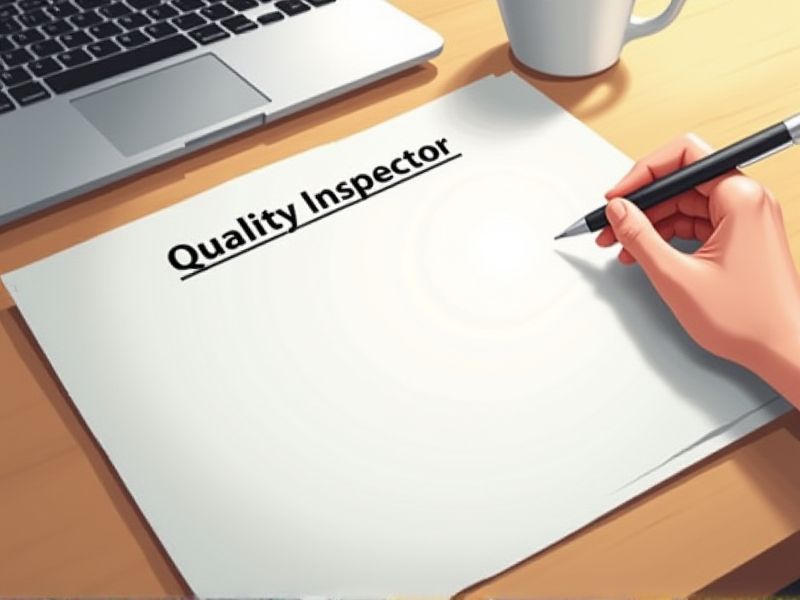
Quality Inspectors play a crucial role in maintaining product standards and ensuring compliance with industry regulations. By obtaining specific certifications, these professionals can demonstrate their competence and adherence to best practices, which boosts organizational credibility and customer confidence. Quality certifications contribute to a structured framework for identifying and mitigating defects, thus enhancing the overall production process. Some key certifications you may consider for a career as a Quality Inspector include the following.
ASQ Certified Quality Inspector (CQI)
The ASQ Certified Quality Inspector (CQI) credential is essential because it validates the inspector's knowledge of quality control principles, ensuring competence in performing accurate measurements and inspections. This certification enhances a professional's understanding of quality standards, which increases their ability to identify defects and improve production processes. Employers benefit by having certified inspectors who can maintain compliance with industry regulations, reducing product recalls and associated costs. ASQ CQI also provides inspectors with a competitive edge in the job market, reflecting their commitment to quality and continuous professional growth.
ASQ Certified Quality Technician (CQT)
The ASQ Certified Quality Technician (CQT) certification demonstrates a thorough understanding of quality control principles, which improves a Quality Inspector's effectiveness in identifying defects. This certification ensures that inspectors possess critical problem-solving skills that lead to more efficient production processes. By adhering to standardized practices, CQT-certified inspectors contribute to reducing operational costs through fewer errors and reworks. Employers often prefer CQT-certified individuals as they are associated with maintaining higher quality standards, which boosts customer satisfaction and brand reputation.
ASQ Certified Quality Auditor (CQA)
The ASQ Certified Quality Auditor (CQA) equips a quality inspector with comprehensive auditing skills, ensuring adherence to quality standards. This certification validates the inspector's ability to systematically examine processes, fostering continuous improvement. Organizations often require CQA certification to minimize production errors and enhance product reliability. A quality inspector with CQA credentials is more likely to contribute to cost reduction by identifying inefficiencies early.
Six Sigma Yellow Belt Certification
Gaining the Six Sigma Yellow Belt Certification equips Quality Inspectors with essential problem-solving tools, enhancing their ability to identify and eliminate defects. This certification provides a foundational understanding of process improvement methodologies, which can lead to increased efficiency. With knowledge of Six Sigma principles, Quality Inspectors can contribute to higher quality standards and improved customer satisfaction. Companies recognize certified individuals as valuable assets, often leading to better job prospects and career advancement opportunities for the inspectors.
Six Sigma Green Belt Certification
Obtaining a Six Sigma Green Belt Certification equips a Quality Inspector with essential skills in process improvement, leading to more efficient operations. The structured methodology learned through this certification enables inspectors to tackle and reduce variations that cause defects. Enhanced problem-solving abilities contribute to better quality control and improved customer satisfaction. Companies often prefer certified inspectors as their expertise can significantly lower operational costs and increase overall quality.
ISO 9001:2015 Internal Auditor Certification
ISO 9001:2015 Internal Auditor Certification equips a Quality Inspector with a comprehensive understanding of quality management systems, enhancing their ability to identify and rectify potential process inefficiencies. By gaining certification, the inspector can ensure compliance with internationally recognized standards, thereby reducing the risk of errors. This certification also empowers inspectors to conduct systematic audits that contribute to continual process improvements. Holding the certification boosts the inspector's credibility and trust with stakeholders by demonstrating a commitment to quality excellence.
Lean Manufacturing Certification
Lean Manufacturing Certification equips quality inspectors with the tools to identify and eliminate waste, directly enhancing operational efficiency. Certification ensures a consistent approach to quality checks, reducing variability in inspection results. With Lean principles, inspectors gain the capability to streamline processes, leading to a decrease in production defects. The certification encompasses problem-solving skills, improving the overall ability of inspectors to address quality issues promptly.
Total Quality Management (TQM) Certification
Achieving Total Quality Management (TQM) certification equips a Quality Inspector with comprehensive knowledge of industry standards, ensuring consistent product quality. With TQM principles, inspectors can effectively identify and reduce defects, which leads to increased customer satisfaction. Organizations with certified inspectors often experience improved operational efficiency, as consistent quality control practices eliminate costly rework. Certification also enhances a Quality Inspector's credentials, broadening career opportunities and potential for advancement.
Statistical Process Control (SPC) Certification
Obtaining an SPC certification enables a quality inspector to effectively monitor and control production processes, which reduces process variability and improves product quality. Understanding SPC tools allows inspectors to identify trends and root causes of defects, leading to timely corrective actions and cost savings. The certification signals a commitment to quality, fostering trust with customers and stakeholders. A certified inspector can contribute to higher compliance with industry standards, minimizing risks of non-conformance and recalls.
Root Cause Analysis (RCA) Certification
Root Cause Analysis (RCA) Certification equips quality inspectors with the skills to accurately identify and address the underlying causes of defects, reducing recurring issues in production. Enhanced knowledge in RCA leads to improvement in product quality, thereby increasing customer satisfaction and trust. Through RCA certification, quality inspectors can contribute to more efficient processes, translating into cost savings for the organization. Certification also provides a competitive edge, demonstrating commitment to maintaining high standards in quality control.
Summary
When you obtain certifications as a Quality Inspector, your credibility and expertise in the field will significantly increase. Employers are likely to trust your judgment more, which can lead to career advancement opportunities. You may experience an improvement in job performance due to enhanced knowledge and skills. This recognition can also broaden your professional network and accessibility to higher-paying positions.
